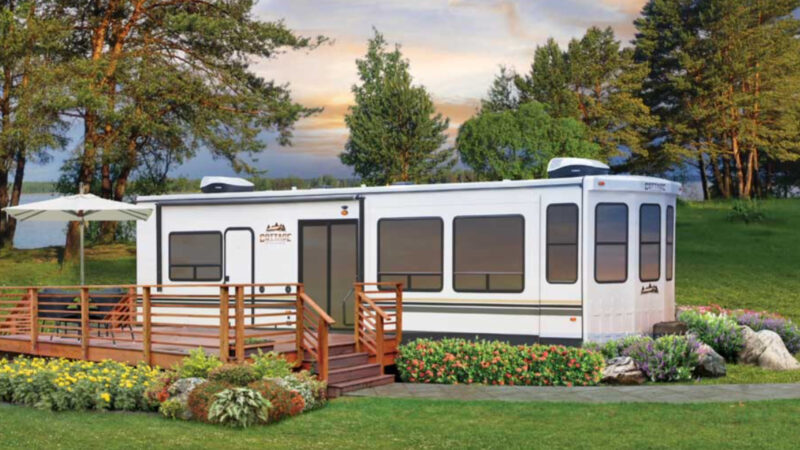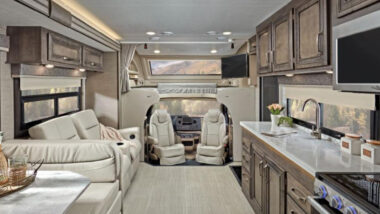Table of Contents Show
If you’ve stayed in a few campgrounds over the years, you’ve probably seen some unique campers.
From the vintage fiberglass trailers of Scamp and Airstream’s iconic silver bullets to converted school buses 45 feet in length, you probably feel like you’ve seen it all.
But what about trailers with large front windows, sliding glass doors, and second-story lofts? Now those are unique! If you’ve seen a trailer like this, it’s probably a destination trailer.
Let’s look at what makes these different from the rest and why you might want one in the future!
What is a Destination Trailer?
Destination trailers are different from other towable RVs. Although they’re homes on wheels like travel trailers and fifth wheels, they don’t go from one location to another.
A destination trailer is more like a tiny house. Sometimes you’ll hear people call it a park model. Manufacturers and owners design these units to be stationary for a long time.
So if you want to leave your RV at a local campsite all year, a destination trailer may be the best option.
Destination Trailer vs. Travel Trailer
Let’s look at the differences between destination and travel trailers. Both are towable RVs.
However, their construction, amenities, and size are all affected by their two distinct purposes.
Purpose
A destination trailer remains stationary long-term. A travel trailer, on the other hand, moves from one location to another. Their purpose is to provide short-term accommodations for travelers.
Because of these two very distinct purposes, the overall design of each is different. Destination trailers tend to be heavier, have more residential features, and are entirely self-contained. In contrast, travel trailers are usually more lightweight with simple features and don’t always have a bathroom.
Size
Not only are destination trailers heavier because their design is more like a tiny house that remains stationary, but they’re also generally larger than travel trailers.
These trailers can be taller because they aren’t traveling down the road often. Although some long travel trailers measure 35+ feet, there are more destination trailers with that length. Some even stretch to 40 feet.
The added height and length create a much roomier tiny house. In addition, destination trailers may have more slide-outs than travel trailers, providing even more interior space.
Whether you’re enjoying your destination trailer for a weekend or an entire season, there’s more space for privacy and entertainment.
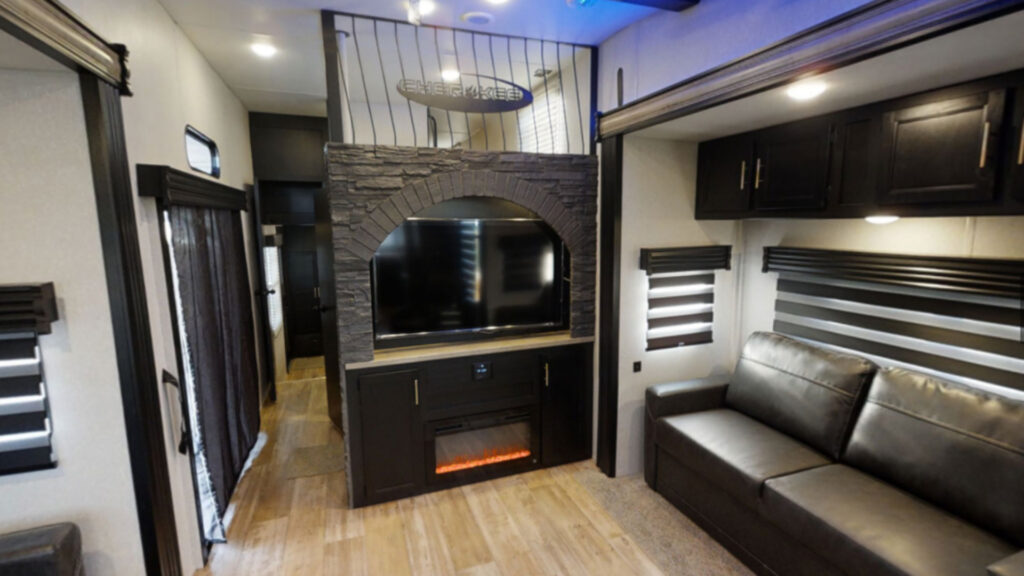
Residential Features
You’ll find many destination trailers that feel like residential houses. The kitchen space is incredibly spacious compared to travel trailers. Many destination trailers have kitchen islands, residential refrigerators, and full-sized stoves.
You might also find a bathtub, a full-sized shower, and a standard toilet in the bathroom.
Destination trailers with ample space for children may also feature a loft. These trailers have stairs leading to additional sleeping spaces, which can feel like a two-story house. Because a destination trailer can be taller than a typical travel trailer, you can design these features for stationary use.
Self-contained
Not all travel trailers are self-contained. You’ll find floorplans without a bathroom, so owners must use the campground bathhouse.
A destination trailer, however, will be fully self-contained because the intent is to use it long-term. There will be a black tank for waste from the toilet and a gray tank for wastewater from the showers and sinks.
What Do I Need to Tow a Destination Trailer?
Because a destination trailer tends to be large and heavy, it’s crucial to tow it with a heavy-duty vehicle. You can tow some travel trailers with an SUV or half-ton truck.
However, when a destination trailer weighs over 10,000 pounds, you need at least a three-quarter-ton truck. Plus, park models aren’t aerodynamic. It will feel more cumbersome towing a destination trailer, so you’ll want a strong engine and powerful brake system to haul it around.
Keep in Mind: Looking for a truck for towing? These are Hands Down the Best Trucks for Towing on the market
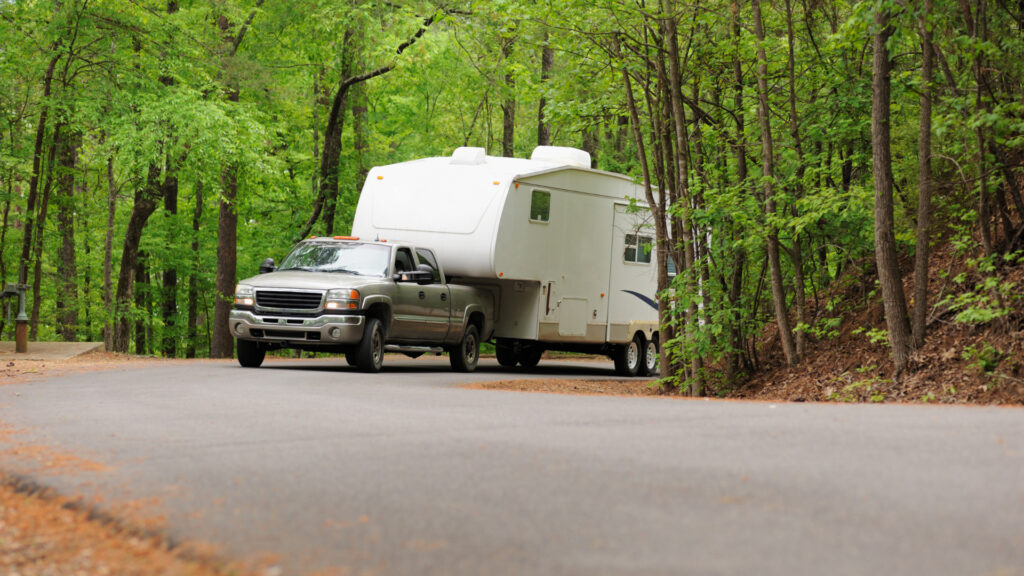
Who Should Buy a Destination Trailer?
Campers who plan on staying in one place for a long time will like the features and amenities of a destination trailer. But other campers who want to jump from one campground to another won’t find the towability of a destination trailer very easy.
Snowbirds who venture south for the entire winter may enjoy staying for three or four months in a destination trailer on the beaches of Florida. Someone who wants to live in a tiny house in a secure location, like at a campground, may find a destination trailer an excellent fit.
But those who wish to travel frequently and visit numerous places won’t find a destination trailer to meet their needs.
Things to Look for in a Destination Trailer
If a destination trailer is in your future, there are a few things to consider. First, you want a trailer with superior construction. If you’re living in a park model for months or even years, it needs to withstand the wear and tear of daily life.
You also want to find a floorplan that works for you. If you don’t have children, a destination trailer with a loft isn’t necessary. Additionally, if you’re a solo camper, you don’t need a destination trailer with two bedrooms.
If you love to entertain and cook for friends, then pay attention to the kitchen and living spaces. Make sure the features and appliances are what you need based on your style.
Keep in Mind: If you love to cook, then you need to look into a Rear Kitchen Fifth Wheel!
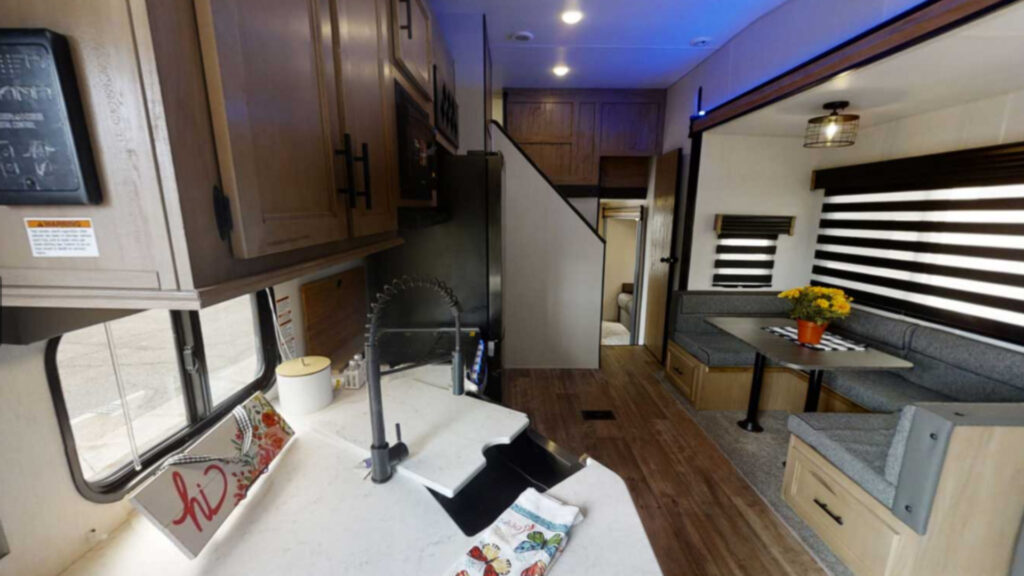
Are Destination Trailers Worth It?
If you have a favorite campground in the mountains of Tennessee that you would love to visit every weekend in the spring, summer, and fall, you might consider buying an annual campsite and putting a destination trailer on it.
These units provide ample space for campers who have a favorite spot and want to remain there for months or years.
However, if you’re looking at what camper to get for a cross-country road trip, stick with a travel trailer. It will be more aerodynamic, more accessible to tow, lightweight, and still offer you the accommodations you need for a journey.
So you’ll have to decide; Is a destination trailer or a travel trailer in your future?




